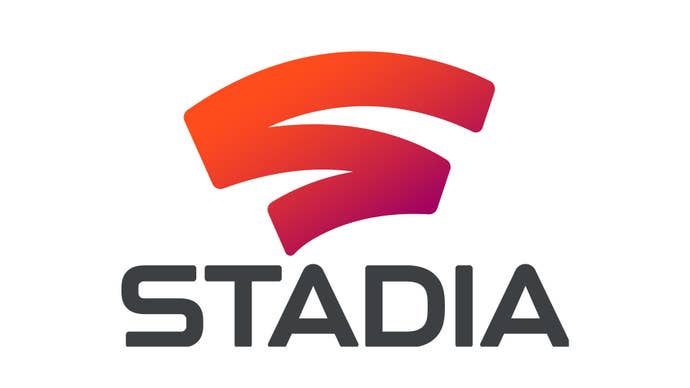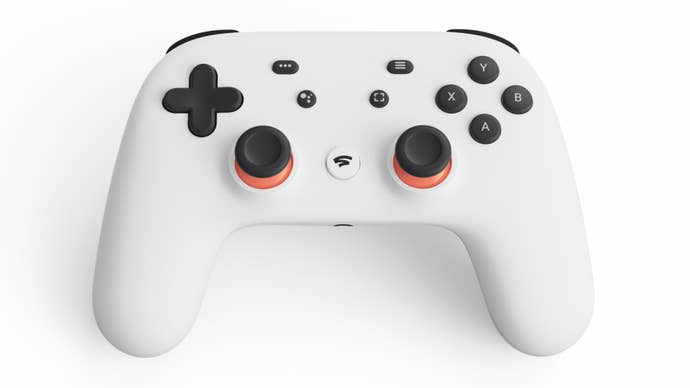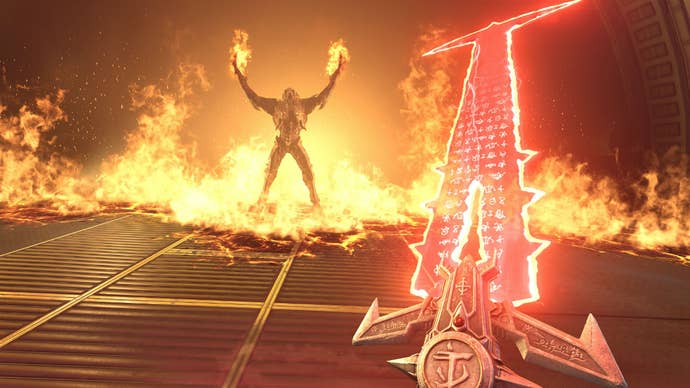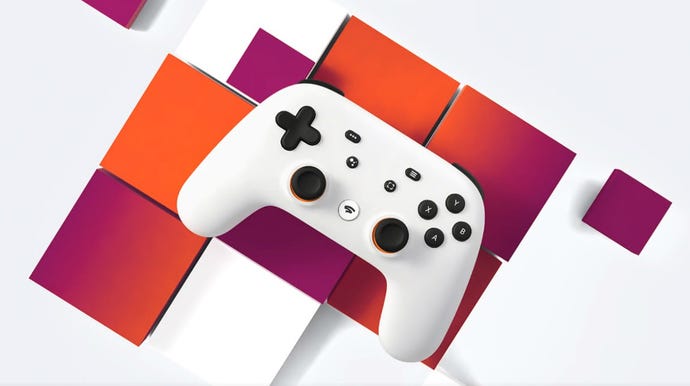Google Stadia Interview: Discussing Safety, Price, and Internet Connection Speeds
We spoke with Google to learn more about Stadia.
This article first appeared on USgamer, a partner publication of VG247. Some content, such as this article, has been migrated to VG247 for posterity after USgamer's closure - but it has not been edited or further vetted by the VG247 team.
At the Game Developers Conference in San Francisco this year, one of the biggest topics of the week came from Google and its new Stadia streaming platform. The demonstration gave players a peak of Google's vision, which offers instantaneous access to games through its web browser.
Yet, there are still a lot of questions that have been left largely unanswered. While Google is still keeping some information secret, in an interview with Google's director for games business development Jack Buser, we were able to find out more about its overall vision for the video games industry. And Google has big plans for game development that extend beyond just a new streaming service, but into game development itself with features like Google Assistant integration.
USG: My impression was that the model for buying games is similar to existing models where you go into, say, the PSN store, link an account, buy a game, and own a library. Is that accurate?
Jack Buser: We've given some details around that type of experience. Notably in the keynote there was this vision that the internet is your store. With Stadia, we're able to merchandise games basically anywhere on the internet. So, they showed examples of multiple social platforms, even platforms that aren't Google's platforms, working on Stadia which is super exciting.
I own a Samsung Galaxy phone. Will Stadia work better on a Google Pixel phone rather than my other Android phone?
JB: So we haven't spoken in detail around those types of questions. I will say, you can think of Stadia a lot like YouTube. So our vision really for the Stadia service is that wherever you're able to enjoy YouTube is a potential place where you can be enjoying Stadia.
Where does Google see itself in the current video game ecosystem? Is Google trying to compete with existing hardware companies?
JB: So I think this is something new, something the world has never seen before. And different people interact with services in different ways. One of the things that's exciting about Stadia in particular is that it really sort of democratizes access to games. It really breaks down barriers to being able to get to games wherever, whenever you want. I think you saw a lot of technology in the keynote that create different types of experiences, the types of experiences that can never be delivered on a console or PC.
I think you also saw sort of this notion that the platform would evolve over time. So starting with things like no patches, no updates, you just start the game and it goes. But also you saw sort of this vision of evolution of the service, where it will get better and better over time, which is super exciting. So, again, this is new. The world has never seen anything like this before which is one of the reasons why it's so exciting for us.

Where I live, I have pretty good internet thanks to fiber. But what about people who don't have fiber, who don't live in major cities. How will Stadia work for them?
JB: A wise person once said, "don't bet against the internet." So you think again of Stadia a lot like YouTube. If you're able to get a high fidelity YouTube experience in your home, you're probably in pretty good shape for Stadia.
What internet speeds are we talking about specifically?
JB: Well, so, are you able to play a 4K YouTube video in your house?
Yes.
JB: So I mean you're probably in pretty good shape for Stadia. We haven't talked specific data rates but you can think about [Stadia] a lot like YouTube.
And what about things like data caps. Will Stadia be taxing for customers with limited amounts of data?
JB: Again, it's fun to keep coming back to it, but it's very true. Stadia is actually a lot like Netflix or YouTube in terms of overall experience consumption of media. So if you're watching lots of online video content in your home right now with no issue, you're probably in pretty good shape for Stadia.
So let's talk about the Google Stadia controller. It connects directly to the cloud, which could improve latency. Will Stadia's controller work better than the controllers I already own?
JB: Essentially the way the controller works is, you got it right. So [the Stadia controller has] got wi-fi built in. So, it's actually connected directly to the game running in the cloud. And the cloud is streaming down to the endpoint. So that just eases all kinds of stuff, like in terms of just setting it up. I'm not sitting here trying to figure out how to pair it with a device, that kind of stuff.
And you also mention because you have that direct connection to the cloud, you're able to even further improve the experience. I think we proved with Project Stream, you had people bringing their own controller, basically playing Assassin's Creed Odyssey in a browser. I mean we saw some amazing comments, people were having an amazing experience.
Sure, I guess what I'm saying isn't necessarily "will a PS4 controller be bad for Stadia," but rather will a Stadia controller be better?
JB: It will be better with a Stadia controller, that's right.

What's Google's vision for game development? Is it building first-party titles similar to Nintendo?
JB: We haven't talked too much about the content that would be on the platform just yet, so stay tuned for further announcements in 2019. I think you will find that there will be a robust selection of games. We announced you'll have content both from our publishing partners and developers. And then we also saw that Google is essentially starting a first party effort. So, I think there's going to be a great diversity and variety of games on the platform and you'll learn more on that soon.
What about safety? Will Stadia ensure that kids won't just be able to access whatever content they want since it looks so easy?
JB: So, I think from a Stadia perspective you also saw on stage that there will be parental controls. Again, you're going to see a great diversity of content on the platform. You'll see content for just about everybody and we want to make sure that families have the right controls in place to make sure that the right content is played by the right people. It's something we take really seriously, and you'll find more detail on that moving forward. That's definitely something we're committed to.
Aside from things like latency, what's something Google feels like it has to nail in order to get people interested in Stadia?
JB: The big vision here for us to be able to expand the enjoyment of this amazing content and be able to deliver it to more people than ever before. I think that that is really the big opportunity for us here. If you look at the current industry for high fidelity triple-A games, it really is limited to the hundreds of millions of people. Our vision is to bring this type of content to potentially billions of people. So, I think that that's probably the biggest opportunity in front of us right now, and really the thing that motivates us.
What about pricing? I know you haven't announced anything, but is this going to be like a subscription service?
JB: I think I can say right now that Google is known for providing products to people all over the world at price points that make them accessible. And so I think you'll see a similar type of philosophy used for Stadia here. If the vision is to bring, you know, triple-A gaming to billions of people all over the world, we want to make sure that we can do it in a way that folks can actually access it.

Lastly, let's talk about Google Assistant. In the demo it looks like you can get help from the Assistant while playing a game. Will it put our guides writers out of work?
JB: The opportunity for Google Assistant in games is pretty staggering. I've played games my whole life, been in the industry for a long time, and every once in a while you see a technology come along where you're like, 'Okay, we can do something really, really magical with this.'
You know, I've been very fortunate. I've talked to developers all over the world. And when you start to talk about the applications of the Google Assistant technology in the context of gameplay, you find creative ideas all across the board. What you saw today, where someone needed help in a game and then they asked the Google Assistant to help, is literally just scratching the surface of where we can go with this type of technology.
If you look at Google Assistant in just the field of natural language processing—I mean, imagine a future where you could just speak naturally to your game and it just understands you. These types of potential applications, I think, are incredibly exciting. Imagine a game where we're not necessarily just clicking through a dialogue tree, but you're actually naturally interacting with a game.
And I think you're going to see similar types of experiences come to games. And again, we're providing these tools and technology. But it's really going to be game creators that take these tools and manifest them to these experiences that frankly the world has never seen before.
Check out our Google Stadia guide for more of our coverage on Google's upcoming streaming service. This interview has been edited for clarity.


